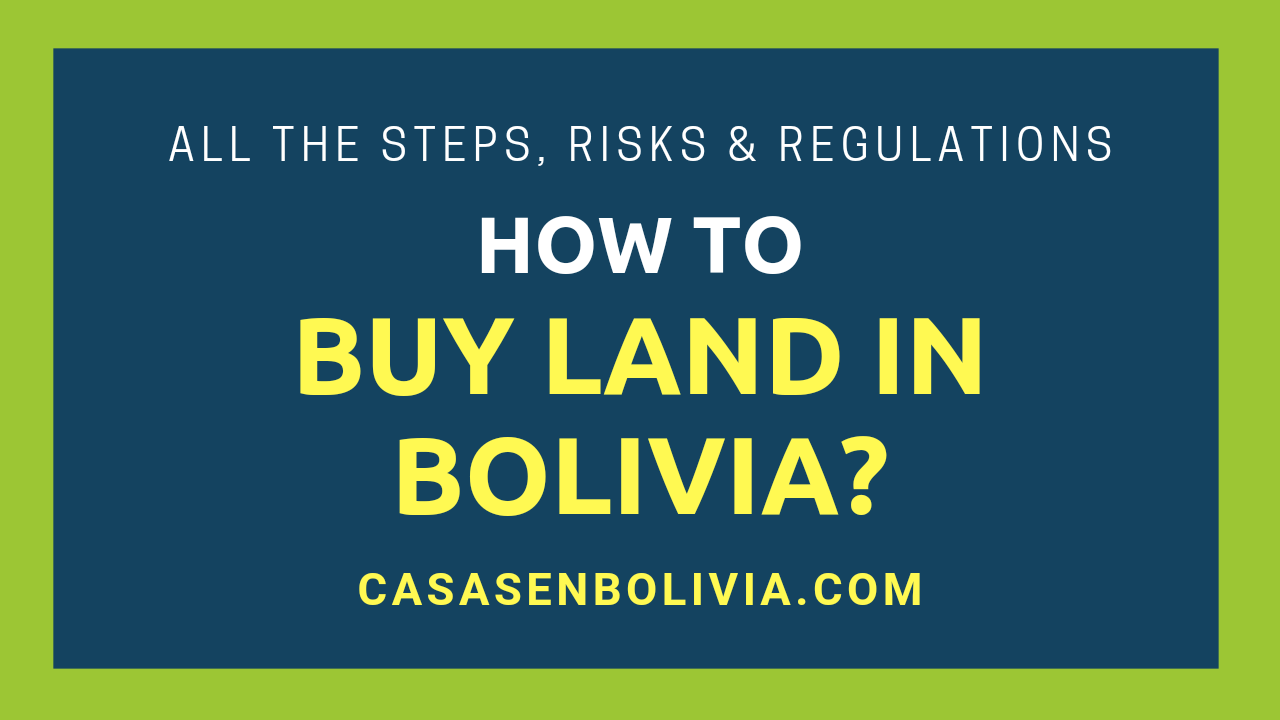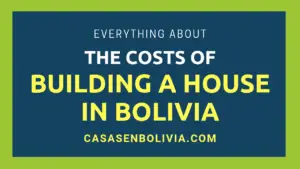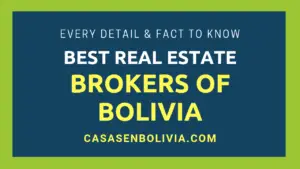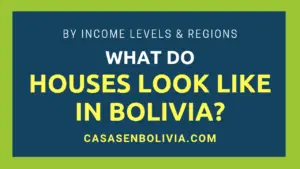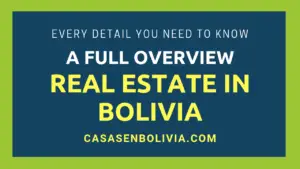Last Updated on February 15, 2025
Buying land in Bolivia is quite similar to purchasing any other type of property, and the process you need to follow is nearly identical to that of a Bolivian citizen. However, it has its own specific regulations. For example, foreigners cannot purchase rural land, and tourists are prohibited from buying any type of property. Furthermore, there’s a significant risk of scams when buying land in Bolivia, which you must be aware of.
To buy land in Bolivia, you need to: 1) become at least a temporary resident; 2) find the land best suited to your needs; 3) conduct thorough anti-scam checks; 4) pay the land sales tax; 5) sign the public deed for the land sale; and 6) register your ownership with the Derechos Reales entity. Only urban land is available for purchase by foreigners.
Here, we’ll discuss all the steps, risks, and regulations you need to understand to buy land in Bolivia, providing comprehensive details, including requirements, costs, and the timeline for this process. We are Bolivian real estate experts (see our Bolivian website) who live in Bolivia and assist many people here in achieving their real estate project goals.
Warning: You Cannot Buy Land as a Tourist in Bolivia
If you are solely a tourist in Bolivia (possessing only a tourist visa), you are not permitted to purchase land or any real estate property in the country.
Bolivian law requires that, to possess rights and responsibilities and to be protected and governed by Bolivian law, you must be properly registered *and possess a Foreigner ID card* issued by the Bolivian government. *To obtain this, you must be at least a temporary resident.*
Nearly all other types of visas, except for the Bolivian tourist visa, will allow you to become a temporary resident and obtain your foreigner ID document.
Once you have this document, you’ll enjoy all the rights, without any limitations, that Bolivian law grants to Bolivian citizens. This includes, for instance, the ability to work, open a bank account, engage in real estate transactions, invest in businesses, purchase stocks on the Bolivian stock market, and generally do almost everything a typical Bolivian can do.
Obtaining Bolivian temporary residency status is a somewhat complex process, *requiring a valid reason*. For example, you might be planning to work here, be part of an embassy or similar organization, or be coming for health or educational purposes, etc.
We have a comprehensive guide on obtaining temporary or permanent residency, among other statuses in Bolivia, available here: [Link].
After obtaining this residency status and your foreigner ID, you’ll be permitted to purchase many types of real estate in Bolivia.
The Two Types of Land You Can Buy in Bolivia
Once you have your foreigner ID document and have become at least a temporary resident in Bolivia, you’ll be able to purchase urban land without significant restrictions. *However, rural land will still be unavailable to you* unless you become a Bolivian citizen:
- Urban land: You can purchase this simply by being a temporary resident.
- Rural land: You can purchase this *only after becoming a Bolivian citizen.*
1) Urban Land
Any property and land lot located within a designated “urban area” falls into this category. The urban area could be a major city in Bolivia or a small town classified as urban. Foreigners and expats can purchase urban land lots without any restrictions, provided they are at least temporary residents. Urban land lots, for both Bolivians and foreigners, cannot exceed approximately 100,764 sq ft (10,000 m²) in size.
There is an exception to this rule: individuals from other countries cannot purchase any type of property, whether urban or rural, within Bolivia’s 31-mile-wide (50 km) border zone. Therefore, within this frontier band, you, as a foreigner, are prohibited from purchasing any type of property, regardless of whether it’s urban land, rural land, or any other category.
2) Rural Land
A rural land lot is a property without any structures located *outside a designated urban area in Bolivia, within rural regions*. These are extensive tracts of land situated outside of cities. By law, rural land must have a minimum size of 123.5 acres and a maximum size of 12,355 acres.
Unfortunately, under Bolivian law, *foreigners are prohibited from purchasing any type of rural land* in Bolivia. The only two ways you can acquire rural land are:
- Through a Bolivian company that you own, in some capacity, but the land must be used for productive purposes; otherwise, the government may reclaim it.
- By becoming a Bolivian citizen. We’ll discuss this option further in a later section.
How to Buy Urban Land in Bolivia
Now, let’s focus on the general steps you need to follow to purchase urban land in Bolivia. *Keep in mind that this process is nearly identical to buying any other type of property* within our country, such as houses, apartments, etc.
We have a comprehensive guide on purchasing properties, *including urban land*, in Bolivia, available here: How to buy a house in Bolivia? All the steps and risks. This guide is very thorough and fully applicable to purchasing land lots as well.
Nevertheless, we’ll outline the general steps you need to follow to purchase urban land lots in our country.
Warning: Buying Land in Bolivia is Quite Risky
Be aware that buying land in Bolivia is not without significant risks. Numerous potential hazards exist, and many scammers operate among legitimate land sellers. There’s also a substantial risk of squatting and usucaption, which are significant illegal activities here. Many individuals attempt to occupy abandoned land lots and claim ownership over time.
Therefore, we strongly recommend that you *only purchase land in Bolivia if you thoroughly understand the process*. You’ll need to seek extensive legal advice and understand how legal procedures and real estate function here.
In any case, the most effective land-buying process you should follow is:
- Purchase the land lot with the best possible assistance and knowledge (we’ll discuss this further below).
- Once you acquire the land lot, construct a small rental home on it.
- Rent this small home to a tenant who will also maintain the land lot. (*You should always rent this home using a public deed for the rental and pay all applicable rental taxes*).
- Change your tenant every two to four years (exceeding this timeframe may increase the risk of usucaption).
- That’s it.
By following the above process, you’ll significantly reduce the risk of being scammed or becoming the target of squatting or usucaption in Bolivia. The key to this safety is that: 1) the tenant will prevent potential squatting and illegal occupations through their presence on the property, and 2) the public deed will deter the tenant themselves from attempting these unethical actions.
Also, remember that as a foreigner, *you cannot purchase rural land*; you can only buy urban land lots. We have a comprehensive guide on this topic here: Can foreigners buy property in Bolivia? All facts and regulations.
A) Requirements
The good news is that you’ll need almost the same requirements as any Bolivian to purchase urban land lots in Bolivia. *The difference will be the use of your foreigner’s ID instead of a Bolivian ID document in the paperwork*. You may also need to present your passport, visa, etc.
Beyond these mentioned documents, you’ll need to present others, which will be identical to those required for Bolivians. Additionally, *you’ll need to complete the same paperwork as Bolivians* to purchase urban land in our country.
The required documents include:
- The seller’s personal documents
- Your personal documents
- Folio Real (Translated: Link) of the land lot
- Informe Rapido (Translated: Link) of the land lot
- Public deed (Translated: Link) of the land sale
- Land sales tax payment slip
- Proof of payment for “Derechos Reales” registration services
- Cadastral certificate issued by the local city government.
- Approved plan of the land lot
All these documents will be required at a specific point during the purchase paperwork process. Your legal assistant will provide you with more details about when these documents are needed.
B) Steps
The first thing you need to do is travel to Bolivia to purchase the property. We strongly advise against conducting this purchase process through a representative in our country. *While this might be possible, you face a very high risk of scams and legal complications.*
You should be present in Bolivia *at least to: 1) assess and verify the seller’s legitimacy and the safety of the land lot you intend to buy, with the assistance of your legal advisors; 2) sign the public deed for the land sale; and 3) register your ownership with the “Derechos Reales” entity.*
The general process you’ll need to follow to purchase an urban land lot is as follows:
- Find a land lot that meets your needs, considering location, price, etc. We have a comprehensive guide on how to find a property in Bolivia.
- Contact the seller through the realtor, bank, your representative in Bolivia, or directly.
- Conduct thorough verifications regarding the seller’s legitimacy and the safety of the land lot. This is a very complex task; refer to our guide at the end of this section for more information.
- Negotiate and create a contract with the seller. This contract will become the public deed for the land sale. *Only public deeds, signed by a notary public, are valid for real estate sales in Bolivia*.
- Pay the land lot sales tax. Proof of this payment is a prerequisite for the notary to create the public deed for the land sale. You’ll pay this tax to the city government.
- *Only during* the signing of the public deed for the land sale, or after this event, should you pay the agreed-upon price for the land lot, and not before.
- Complete the remaining paperwork, which in Bolivia is typically the buyer’s responsibility.
- Complete additional paperwork with the government of the urban area where the land lot is located.
- Register your ownership of the land lot with the Derechos Reales entity. This is a crucial step. Only once you’ve registered your ownership with this institution can you be certain that the land lot *legally* belongs to you.
- You’re done!
Keep in mind that the steps outlined above are general, and this process is very time-consuming and somewhat challenging to navigate in our country. This process will typically take between one and six months to complete, and the number of individual tasks you’ll need to perform will easily exceed one hundred.
People in Bolivia typically spend between 100 and 300 hours to purchase a property, including land lots.
Consult our detailed guide on how to buy a house in Bolivia to understand every detail of the steps you need to follow, along with all the necessary precautions, here: How to buy a house in Bolivia? Steps and precautions.
C) Costs
There are several costs associated with the procedures required to purchase land in Bolivia. These costs include the sales tax for purchasing the land, legal and notary public fees, the cost of the registration service with the Derechos Reales entity, seller and land verification costs, among others.
In general, the costs you’ll need to cover are:
- Verification costs, including obtaining the Folio Real and Informe Rapido documents, engaging multiple third-party legal advisors in Bolivia, etc., ~$400.
- The land lot sale tax, 3% of the agreed-upon sales price. For example, if you purchase a $20,000 land lot, the tax will be $600.
- The creation and signing of the public deed at a notary public’s office, ~$50.
- The Derechos Reales registration service fee, 0.5% of the agreed-upon sales price. For example, if you purchase a $20,000 land lot, this fee will be approximately $100.
- The cadastral certificate for the land lot, ~$30.
- The approved plan of the land lot, ~$30.
- Other miscellaneous costs, including transportation, food, accommodation, etc. (for 1 month, *excluding* the cost of your travel tickets to Bolivia) ~$1,000.
Total Cost:
For the example above, involving a $20,000 land lot in Bolivia, the total cost will be $2,210. This represents 10% of the land sale cost, *primarily due to your accommodation costs in Bolivia*.
We typically advise people in Bolivia that, for purchasing a property, including land lots, houses, or apartments, they should *have between 4% and 5% of the agreed-upon sale price available to cover all paperwork* and other associated costs.
However, in your case, it’s different. You need to add to this percentage your costs of traveling to Bolivia and staying here while you complete the purchase process. You can easily add a fixed additional cost of between $1,000 and $3,000 to this percentage to finalize the entire purchase process.
Therefore, as a result, you’ll have the following cost structure:
- The cost of purchasing an urban land lot in Bolivia (which will be *4%-5% of the agreed-upon sales price*) + $1,000-$3,000.
Remember to avoid being overcharged by unethical individuals in Bolivia, including professionals and institutions. The costs presented above are those typically incurred by Bolivians, *and they should be the same for you, perhaps with a slight increase*.
D) Precautions
As we mentioned at the beginning of this guide regarding potential scams and legal conflicts when buying land in Bolivia, *you must be extremely cautious about this aspect of the land-buying process*. Bolivians take this very seriously, as real estate scams are prevalent in our country.
This risk is even greater for you, as you may not be as familiar with real estate and the legal system here. Scammers will likely target you, assuming that, as a foreigner, you’ll be more vulnerable to their schemes.
Therefore, you need to address this issue and understand how to effectively mitigate the risk of being scammed. A very general approach to achieve this is as follows:
- Engage multiple legal advisors, at least three, ensuring that none of them are aware of the others’ involvement (like a third-party verification system). Each should independently verify all documents and the buying process.
- Obtain the best possible referrals for ethical legal advisors. We only recommend seeking referrals from your own embassy or major Bolivian banks.
- Consult the Updated Folio Real of the property. Always request that the seller provide you with the “Updated” Folio Real (ideally, obtain this document with a date matching the day you’ll sign the public deed). *You should also request this updated document during the verification process*.
- Consult the Informe Rapido report for the property. You should always obtain this document when considering purchasing a land lot here.
- Consult, and have your advisors also consult, the property taxes for the land lot, the current Cadastral Certificate, and the current Approved Plan for the land. All these documents are crucial for any piece of land.
- Be personally present during three critical steps of the buying process: 1) when conducting verifications of the seller’s honesty and the safety of the land lot you intend to purchase. *This is where your legal advisors need to perform thorough due diligence!* 2) When signing the public deed, and 3) when registering your ownership with the Derechos Reales entity.
- Always request that the notary public thoroughly review the documentation and paperwork of the sale before preparing the public deed and before you sign it.
- Conduct a technical inspection of the land lot you’re considering purchasing with the assistance of professionals such as an architect or civil engineer in Bolivia.
Keep in mind that these are only general precautions to mitigate potential risks.
However, in our detailed guide on Buying a House in Bolivia, you’ll find more in-depth insights into this issue and the most important precautions you need to take to avoid scams and unethical individuals.
How to Buy Rural Land in Bolivia?
Throughout this guide, we’ve focused on urban land that you can purchase in Bolivia. However, if you’re interested in buying agrarian land or rural land for agricultural or production purposes, you’ll face challenges in accomplishing this.
The standard way to achieve this is *through only one option*:
- Becoming a Bolivian citizen. This is not a straightforward process. We have a guide [link] about this.
However, you might also have two potential workarounds for this issue:
- Establish a Bolivian legal entity (a legal company registered in Bolivia, *but this company must be Bolivian*), and own this company through a partnership, shares, or sole proprietorship. You’ll then be able to manage land in the country, *but only for your company’s production purposes*.
- Sign a shared-risk contract with a Bolivian rural landowner. *Again, this is solely for production purposes*. Currently, there’s a legal gap in this option; the specific, detailed laws governing it haven’t yet been implemented, and this situation has persisted for many years.
However, if you intend to purchase rural land for residential purposes or to conduct activities other than production, your only option is to become a Bolivian citizen.
We have a comprehensive guide on whether foreigners can purchase property in Bolivia, including rural land. You can access this guide here: Can foreigners buy property in Bolivia? All the regulations.
How to Sell Land in Bolivia?
The process of selling a property or land in Bolivia is very similar to the buying process, as the same documents must be presented to the same legal institutions, such as the Derechos Reales entity, the local government, the notary public, and legal advisors.
If you understand how to buy land in Bolivia, you’ll certainly understand how to sell it. The primary differences between the buying and selling processes are:
- Generally, the seller of the land lot is no longer concerned with the procedures *after the public deed for the sale is signed*. Completing the additional paperwork becomes the buyer’s responsibility.
- The buyer, not the seller, pays the land sales tax.
- The seller needs to know how to market their land lot for sale. They can do this with the assistance of a reputable realtor in Bolivia, such as ReMax or Century 21.
- The seller is responsible for paying the realtor’s commission (typically between 2% and 4% in Bolivia).
We have a comprehensive guide on how to sell properties in Bolivia, written in Spanish. This guide is also applicable to selling urban land lots. You can access it here (Translated: Link).
Conclusions:
In this guide on buying land in Bolivia, you’ve learned that there are two types of land properties in our country: urban land and rural land. Only urban land can be purchased by foreigners.
You’ve learned the general steps involved in buying urban land in Bolivia as a foreigner, such as conducting preliminary verifications to guard against scams and dishonest individuals, engaging appropriate legal assistance, negotiating with the seller, executing the public deed, paying the land sale price, paying the applicable taxes, registering your ownership with Derechos Reales, and completing additional paperwork with the local city or town government.
You’ve also become aware of the precautions you need to take to avoid scams when purchasing urban land in Bolivia, such as hiring multiple legal advisors, being physically present at key points in the buying process, conducting thorough verifications, signing a public deed before a notary public, registering your ownership with Derechos Reales, and so on.
We hope this information has been helpful. If you’d like to know more about the actual costs of land in our country, please visit our dedicated guide here: How much does land cost in Bolivia? All the numbers and details.
CasasenBolivia.com, information on living, working, investing, and traveling in Bolivia.

